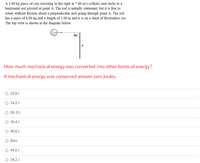Question
Use at least 4 significant figures throughout the entire problem. 9.80m/s2 for the acceleration due to gravity. Do not use 10 m/s2 for the acceleration due to gravity.

Transcribed Image Text:A 2.00 kg piece of clay traveling to the right at 7.00 m/s collides and sticks to a
horizontal rod pivoted at point A. The rod is initially stationary but it is free to
rotate without friction about a perpendicular axis going through point A. The rod
has a mass of 8.00 kg and a length of 1.00 m and it is on a sheet of frictionless ice.
The top view is shown in the diagram below.
90
How much mechanical energy was converted into other forms of energy?
If mechanical energy was conserved answer zero joules.
22.8 J
16.2J
28. 0J
10.4 J
40.8 J
Zero
49.0J
34.2 J
Expert Solution
This question has been solved!
Explore an expertly crafted, step-by-step solution for a thorough understanding of key concepts.
Step by stepSolved in 3 steps

Knowledge Booster
Similar questions
- During 9.67 s, a motorcyclist changes his velocity from v1,x = -39.1 m/s and v1,y = 13.7 m/s to v2,x = -23.7 m/s and v2.y = 29.9 m/s. Find the components of the motorcycle's average acceleration during this process, a,v,x and av.y. Aav,x m/s? dav,y m/s? IIarrow_forwardpls help solve this problemarrow_forwardPls help ASAParrow_forward
- D = (oxt) + (1/2 * 8.93* (4.7)2) I D = 98.63 meter 5. You are about to skateboard down a long hill. Your initial velocity is 2.0 m/s south. When you reach the bottom of the hill you are travelling 6.0 m/s south. It took you 57 seconds to reach the bottom of the hill. What was your displacement?arrow_forwardOn a fishing trip on Lesser Slave Lake you drive your motorboat north at 20.0 km/h for 30.0 minutes. After realizing that you passed your fishing spot, you turn south and travel at 35 hm/h for 10.0 minutes. Determine your average. a) speed for this trip. [24km/h] b) velocity for this trip. [ 6.3 hm/h, North]arrow_forwardYou and your friend each drive 50.0 km. You travel at 90.0 km/h. Your friend travels at 9 km/h. How long will your friend be waiting for you at the end of the trip?arrow_forward
- Compute 3.24 m +0.532 m to the correct number of significant figures. A. 3.7 m B.3.77 m C. 3.772 m D. 3.7720 marrow_forwardA physics 151 student at the top of a building drops water balloons from the edge. A stop watch indicates it takes 1.20 seconds for the balloon to hit the ground. In units of feet how tall is the building? Round final answer to 2nd decimal places. At the end of the problem you must state which direction you choose to be positive.arrow_forward1) A race car travels around a circular race track for which the start line and finish line are at the same location. If the race is 888km long and the radius of the track is 1.414km, how many times did the car go around the track? The race takes 2 hours and 45 minutes, what is the race car’s average velocity (in m/s) over the entire race? What is the race car’s average speed (in m/s) over the entire race?arrow_forward
- Mr. M gets on his bike and rides 11m in the direction of [E52S]. He then changes his direction to [W11N] and rides another 5.7m. a) What was his total displacement? b) What was his distance traveled?arrow_forward1. A pilot flies in a straight path for 1 h 30 min. She then makes a course correction, heading 10 degrees to the right of her original course, and flies 2 h in the new direction. If she maintains a constant speed of 610 mi/h, how far is she from her starting position?Your answer is mi;Enter your answer rounded to two decimal places. 2. A steep mountain is inclined 74 degree to the horizontal and rises to a height of 3400 ft above the surrounding plain. A cable car is to be installed running to the top of the mountain from a point 880 ft out in the plain from the base of the mountain. Find the shortest length of cable needed.Your answer is ftarrow_forward
arrow_back_ios
arrow_forward_ios